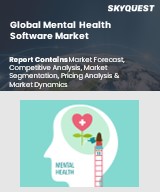
Report ID: SQMIG35A2934

Report ID:
SQMIG35A2934 |
Region:
Global |
Published Date: April, 2024
Pages:
219
|
Tables:
113 |
Figures:
70
Global Mental Health Software Market size was valued at USD 2.81 Billion in 2022 and is poised to grow from USD 3.1 Billion in 2023 to USD 8.00 Billion by 2031, growing at a CAGR of 12.3% in the forecast period (2024-2031).
Mental disorders significantly impact global health, significantly affecting many populations worldwide. According to the World Health Organization (WHO), an estimated 1 billion people worldwide suffer from depression. This figure represents about 13% of the world’s population. Mental disorders include a wide range of conditions including depression, anxiety, depression and schizophrenia. These problems can vary in severity and can have a profound effect on an individual’s life, relationships, and overall well-being.
Furthermore, technological advancements and increasing adoption of digital healthcare solutions have contributed to the growth of the global mental health software market. Mental health software offers various products and services, including electronic health records (EHRs), telepsychiatry, appointment scheduling, clinical decision support systems, and data analytics. These tools enable mental health professionals to streamline their workflow, increase patient engagement and improve clinical outcomes.
Our industry expert will work with you to provide you with customized data in a short amount of time.
REQUEST FREE CUSTOMIZATIONWant to customize this report? This report can be personalized according to your needs. Our analysts and industry experts will work directly with you to understand your requirements and provide you with customized data in a short amount of time. We offer $1000 worth of FREE customization at the time of purchase.

Report ID: SQMIG35A2934